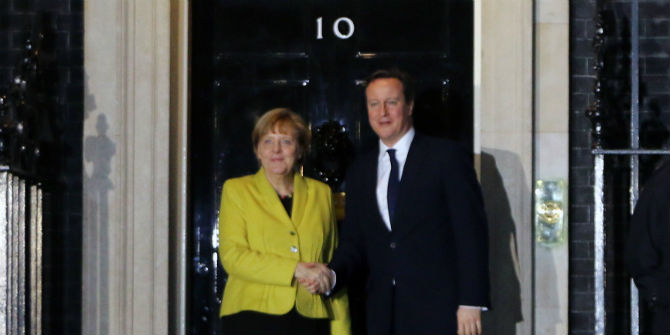 Thousands of EU citizens will be effectively disenfranchised at the European Parliament elections on 23 May, thanks to a little-known rule requiring them to fill out an extra form in order to vote. the3million co-founder Maike Bohn says the Electoral Commission must now extend the deadline for those who have already registered to vote – and answer serious questions about the failings of the UK’s electoral system.
Thousands of EU citizens will be effectively disenfranchised at the European Parliament elections on 23 May, thanks to a little-known rule requiring them to fill out an extra form in order to vote. the3million co-founder Maike Bohn says the Electoral Commission must now extend the deadline for those who have already registered to vote – and answer serious questions about the failings of the UK’s electoral system.
On 7 May, the Cabinet Office minister David Lidington officially announced the UK’s participation in the European Parliament elections. On the same day, thousands of EU citizens were potentially disenfranchised in those elections. That was the deadline for a little-known extra step that EU citizens living in the UK need to take to be able to cast their vote on 23 May.

EU citizens intending to vote in the UK rather than in their country of origin have to fill in an additional declaration form to register to vote in these elections. When it was introduced in 2014, this extra step meant that many EU citizens were turned away from polling stations despite being on the electoral register, due to their failure to fill in the extra form. It became clear that many electoral registration officers had not sent it out to EU citizens on their register. The resulting steep drop in the number of EU nationals eligible to vote, from over one million to some 300,000, prompted the Electoral Commission to promise to ensure “that electoral registration officers are aware that they must send this form.” This commitment was never fulfilled. The Commission’s ultimate excuse is that it was not prepared for the UK to participate in this election.
The uncertainty around Britain’s participation prompted a game of Old Maid between the UK government and the Electoral Commission, with both sides shifting responsibility to each other. It is true, of course, that the situation is complicated by political factors and the short time in which to address them. The government has only just formally announced the UK participation in these elections and that made it difficult for any public body to act without a mandate. This provides an easy excuse for the Commission as to why nothing was done. However, it was clear from 9 April that UK participation was highly likely, and some councils (for example Oxford) sent out the additional form on or shortly after that date. the3million approached the Electoral Commission on 15 April to ask whether they would be contacting all council electoral registration officers to make them aware that they must send out the registration form to EU citizens. The answer was a vague promise of an ‘awareness campaign’ and the defensive statement that ‘the law does not require electoral registration officers to send the form out to all EU citizens’.
While some councils have shown leadership and helped to cut down on extra bureaucracy by sending EU citizens the form and explicitly allowing a return by email, the only evidence we have seen of the Commission’s awareness campaign is two tweets, pointing EU citizens to a badly designed and confusing website, and not even clearly stating that forms could be returned by email too. Not only has the Commission not made any changes to the system and now been caught out by the tight timeframe of these elections, it has shown a deplorable lack of clarity and leadership.
The void left by this inertia was finally filled by some well-meaning initiatives trying to help EU citizens to register electronically. One of them, registertovote.eu, even asked the Commission for guidance and was left under the assumption that its tool complied with all regulations – only to find itself referred to the Information Commissioner’s Office on the afternoon of Friday 3 May, just before a bank holiday. The Commission, true to form, discouraged EU citizens from using these third party apps but did not explain why they should not use them, nor provide any advice to EU citizens on alternative methods of getting the declaration form to their councils until the 7 May deadline.
That deadline has now passed. For EU citizens in the UK, in practical terms, it passed 3.5 days earlier than for UK citizens as the last postal date for those forms to reach local councils was noon on Saturday 4 May. That is 3.5 days out of a total of only 28 days since it became clear EU elections might be held.
The poor process and communication – as well as the Electoral Commission’s general unhelpfulness – have created a messy situation. There are countless examples of EU citizens being sent the form at the last minute, forms being lost and council officers giving wrong advice. This is only one of many complaints:
“My council sent me the extra form on Thursday. THURSDAY. I didn’t find it until I got off work, after the post office closed. So I had a day and a half. Oh, and the accompanying letter was dated 23/04, meaning they wrote it and then sat on it for 2 weeks.”
The treatment of EU27 citizens in this election raises serious questions about the government’s compliance with the most basic principles of democracy. As Paul Behrens, a Reader in Law at the University of Edinburgh, says:
“In a democracy, it is not enough that you have, in theory, the right to vote; every voter must have equal access to the ballot papers. When parts of the population are given insufficient time to return a registration form while other voters have already received their polling cards, the fulfillment of this principle is much in doubt. EU law is very explicit about the need to give the necessary information to voters in a timely manner, and with good reason.”
The EU citizens who have made their homes in the UK are arguably the most “European”, with lives stretching across the Channel, but we are now fast becoming the least politically represented in Europe. It is too late for those who haven’t even registered to vote in the UK, but the government has a moral and democratic duty to help those who have already registered by extending the deadline or even allowing the form to be submitted at the polling station on 23 May.
And when those elections are over, we need to have a serious conversation about addressing the disenfranchisement of EU citizens post-Brexit.
This post represents the views of the author and not those of the Brexit blog, nor the LSE.
Maike Bohn (@maikebohn) is co-founder of the3million.







Even though I voted leave I have to say that this situation is pretty disgusting.
Would be interesting to see what happens if disenfranchised EU voters blockaded the polling stations until they were issued a ballot paper. Especially somewhere like London.
John
Many of the EU citizens resident in the UK will have the option of instead voting in their home country. (They have to choose, you cannot vote twice in EU elections.) I wonder why on earth anyone in this position would WANT to vote in EU elections in the UK, since the UK representatives to the EU Parliament will slmost certainly be sent packing soon.
I think for many EU citizens “home” is in the UK and they therefore want to vote for UK representatives, however short-lived they may be. And there might of course be a further extension…
Alias is right. If EU citizens have the right to a postal vote in their own country it makes much more sense to vote there. Only those who have no right to vote either here or in their country of origin are disenfranchised. Can Make Bohn tell us exactly how many fall into that category?
Citizens of other EU member states who are living (and working in Britain) should not be allowed to vote in elections in this country and should instead be voting for MEPs in their country of origin.
Re-Karl. That is a pretty outrageous point of view. I have been living and working in Luxembourg since 1981 and during all that time have not been allowed to vote in the UK European Elections because of the UK’s undemocratic electoral laws (despite being a UK taxpayer and property owner throughout the whole period). Fortunately, Luxembourg has allowed me to vote in the European elections in Luxembourg.
I can understand that you might think that an EU citizen in the UK might this time prefer to vote in their country of origin because of the risk that UK MEPs will not be there long, but it is not yet clear that Brexit will in fact happen.
I don’t consider it outrageous at all. Unless people who are living (and working) here and are originally from other countries and have since become British citizens, then I do not think they should be able to vote here and have any influence whatsoever on who represents this country in whatever capacity.
Karl – other words you can work here and support system by paying taxes, bust economy like all those hated hard working Poles which help this country to survive 2008 Recession. But we don’t give a fu*k what you got to say. So pay your duties and Fu*k off, is that right?
No, it isn’t right.
Yes, there are many Poles working here, just like many of others from other EU member states, I’m not sure where you get the “hated” from.
If you are working here and paying taxes then you are also reaping the direct benefits which come from that, Transport, Infrastructure, Transport etc, and rightly so.
But unless you are a citizen of this country why should you be allowed to participate in a process which decides the future direction of this country.
Krzysztof: If you live, work, pay taxes and naturalise here, you have as much right to vote in the elections as anyone else here. If you’re only here temporarily, you should be voting in your own home country instead.
Personally, as someone likely to emigrate (my wife not being British), I’d intend to naturalise and switch to voting in my new home once eligible (3-5 years), and don’t find it at all unreasonable that my UK voting rights will expire a decade after I become eligible to vote there instead – if anything, it is that ten-to-twelve year overlap which seems unjust.
I have just been refused to vote, because my form arrived 4 days late. I am a teacher, My head was with getting the students the best results during these tough exam times. I tried to register online, but it kept crashing, but I had thought I was actually registered, as I voted in the local elections. I sent the form just so that I was 100% allowed to vote. I have begged the council, but to no avail. I think this is appalling and sums up a lot of feelings for me about the current situation in the UK, not necessarily because of Brexit, but because of what has happened to the education system, social services, the police force. etc, since I arrived here 15 years ago. I thought voting was my human right. How many times do I have to register? And I agree with the article – I am 100% certain that this was done on purpose. Shameful!
Since EU citizens were potentially already registered for local elections, a low tec solution to prevent them also voting for the European Parliament in the country of their citizenship would have been for polling station officials to have a stack of paper forms at the polling station. The EU citizen comes to vote and, in order to be able to do so, signs the declaration there and then at polling station.
Does anyone know how many people were actually affected? I’ve not seen any accurately reported figure. It seems unclear whether or not significant numbers of people wanted to vote in the UK but couldn’t.